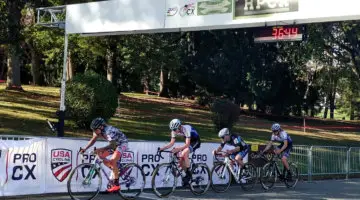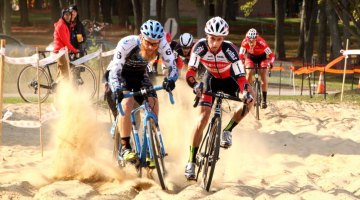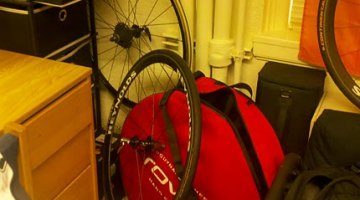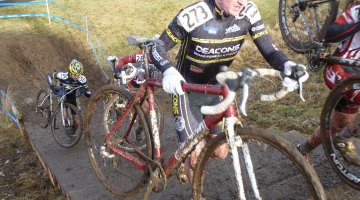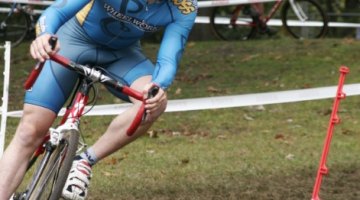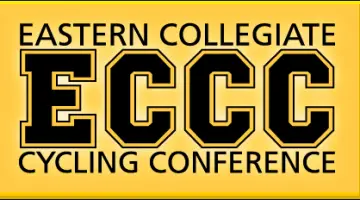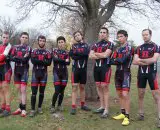
Vareschi is the team director for the Rutgers University Cycling Team (pictured second from left). © Rutgers University Cycling Team
Welcome to the Collegiate Chronicles, the new column that features all things collegiate (sans the keg parties, of course). Collegiate cyclocross is a fast-growing sector of the sport with little written about it, and we plan to change that. We’ll be taking a look at collegiate riders from all levels and from all over the country, race organizers, conference directors and some of the great characters that make up collegiate-level cyclocross.
For our first piece, we have Mark Vareschi, the team director of the Rutgers University Cycling Team, talking about how the team went from a five member road team to a team that has won the Eastern Collegiate Cycling Conference Cyclocross Championship for the past five years. Through grassroots organizing, a keen dedication to seeking out great sponsors and riders, and some serious doses of punk-rock DIY attitude, the team has become a legitimate grassroots collegiate cyclocross team, sending four of their riders to US Nationals in Bend, Oregon this past December. [Ed. Note: this is Online Editor Molly’s alma mater.]
Mark “Mama Bear” Vareschi has been an integral part in transforming the team into the cyclocross powerhouse that it is today and this week, he’s sharing some background on how the team evolved. In the next installment of the Collegiate Chronicles, Vareschi will talk about his tips for how a collegiate team can go about building their own cyclocross team.
Cyclocross Magazine: What was the Rutgers team like when you first joined?
Mark Vareschi: When I joined the Rutgers University Cycling Team in 2003, it was quite small. I think we had five or six active members. It was also an older team; most of us were graduate students who had started racing in college or later in life. We were primarily a road team then.
CXM: What made you want to get them team involved in racing cyclocross?
MV: The main reason I started to get the team into racing cyclocross was that I was tired of driving to races in New England by myself! It was lonely. I’m not sure that there was any intention of making it a cyclocross-focused team. My first bike race was a cyclocross race. I came from a cyclocross and mountain biking background and had been racing cyclocross since 2001. ’Cross is what I knew and what I loved. I lucked out in coming to Rutgers because there were already people racing cyclocross, a weekly ’cross practice, and our USAC sister club, the Highland Park Hermes, promoted a ’cross race in the Mid-Atlantic Championship Cyclocross Series. I slotted into a community that already knew about cyclocross. What happened at Rutgers was sort of an extension of what was going on in the larger cycling community around us.
CXM: What made Rutgers Cycling shift focus to cyclocross?
MV: My role was to get folks on the team interested in, and excited about, cyclocross. It’s easy to do, especially for beginning bike racers. Cyclocross is the most accessible discipline of cycling. The equipment doesn’t matter all that much. We have riders racing on mountain bikes, single speeds, and the occasional hacked road bike. It also doesn’t matter if you get dropped. In road racing, when you get dropped, your race is over. This is immensely discouraging for beginning racers. In cyclocross, you inevitably find your group and race the course. Cyclocross became the gateway to bike racing for the team. Once we got kids racing cyclocross, they had the confidence and desire to race road and mountain bike. In many ways, though we’ve been cyclocross focused for the past 5-6 years, the program has gotten stronger in all disciplines because of cyclocross.
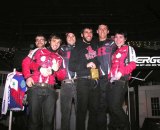
Rutgers University Cycling on the podium for the Eastern Collegiate Cycling Conference for Cyclocross in 2009. (Mark is third from left). © Rutgers University Cycling Team
We are extremely lucky to be in a tight and active cycling community that loves cyclocross. This community provided the support and continuity that many collegiate teams often struggle to find. The weekly ’cross practices and the Highland Park (now HPCX) UCI cyclocross race both predated my coming to Rutgers and the team’s success in cyclocross. I think without the larger community outside of the University, we would not have grown in the way we did. I think the general growth of cyclocross was also key. The reinvigoration of a national series (don’t forget that the Saturn SuperCup existed before the USGP, kids) certainly helped with the visibility of the discipline and drove the market to make cyclocross bikes better and cheaper. And, for us, the Eastern Collegiate Cycling Conference’s (ECCC) decision to add a cyclocross series in 2005 absolutely led to the focus on cyclocross.
CXM: How did Rutgers Cycling come to be such a force in the ECCC for cyclocross?
MV: Though the team has grown in rider numbers, we’re still a relatively small team in the ECCC. With a small team, it’s difficult to be competitive for conference titles during the road season. We quickly realized that we could find our niche in cyclocross, and it’s been wildly successful. We’ve won five straight ECCC championships in cyclocross. Success motivates further success, so we’ve directed our energy toward recruiting and training cyclocross racers, putting on clinics and practices, and co-promoting the HPCX cyclocross race. At this point the team has momentum.
CXM: What’s going to happen to Rutgers Cycling, now that a lot of key members are graduating?
MV: Because a lot of the core team members graduated this year, it will be a transitional year. Right now, the structure is in place. The culture is in place. That makes it easier. The team isn’t re-inventing the culture of ’cross that has grown up around them. It may be tough, but I think we have established something really special here and the members of the team who will be at Rutgers in the Fall know that and new riders coming to the team are doing so because of that. I’m really hopeful and optimistic. Collegiate teams tended to work on boom and bust cycles. You see a team coalesce and have two or three amazing years and then everyone graduates. We’ve put a structure in place where we can just plug people in. The roles are all established, and we have some amazing young riders to fill them.
CXM: You’ve had great sponsorships, what’s your secret?
MV: We’ve been able to get amazing sponsorship for the team, which has been hugely helpful. We’ve succeeded in that not just because of race results, but because of good writing and judicious use of new media. Early on we realized that presenting the team professionally in all things really mattered. Central to that has been how we represent ourselves in our sponsorship proposals, website, and blog. I think a lot of younger cyclists believe that being really fast is enough. It rarely is. We have worked really hard to cultivate personal relationships with our sponsors and sell them on Rutgers University Cycling as a really good product.
CXM: So, what’s next for Rutgers Cycling’s “Mama Bear”?
MV: Watching the team grow has been incredible, but after eight years at Rutgers, I am moving on (I have a PhD in the humanities, it takes a while). Cycling in general, and collegiate cycling in particular, has been absolutely transformative to my life. I’d like to think that’s the case for the riders who are and were on this team. I have loved watching my riders grow as racers and as people. So much happens between the ages 18 and 22, and it’s been amazing to see my teammates develop and change. I’m going to miss that.
Be good, little bears. Eat breakfast, get plenty of sleep, ride your bike.
Next week: Vareschi talks about how your school can build a winning cyclocross team.
Tidbits about Mark:
Favorite collegiate race:
2006 Collegiate Cyclocross Nationals in Providence. I had a great race and achieved my goal of finishing on the lead lap at Nats. At the end of the race, JD Bilodeau gave me a vegan cookie.
Best Results:
ECCC Men’s B Cyclocross Series Champion 2007
1st Collegiate Men Bear Creek Cyclocross 2008
2nd Collegiate Men Nittany Cross 2007
3rd Men’s B Walstib Cyclocross 2007























